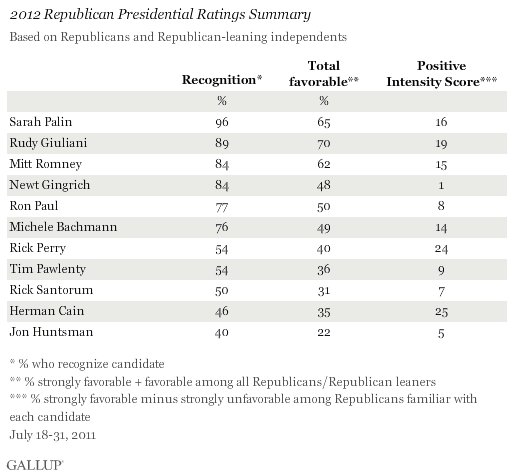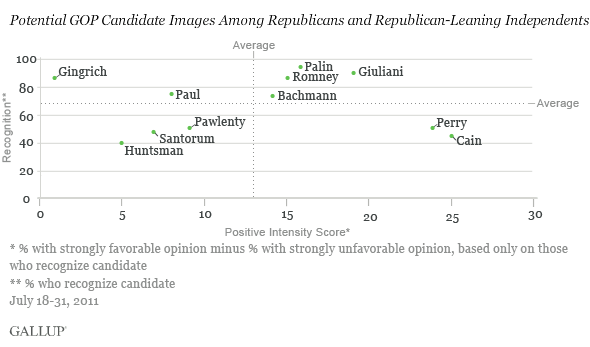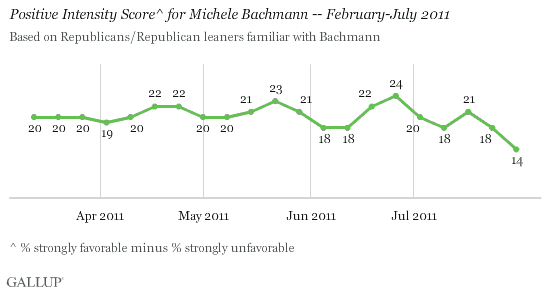PRINCETON, NJ -- Sarah Palin, Rudy Giuliani, Newt Gingrich, and Mitt Romney continue to be the most widely recognized potential candidates for the 2012 Republican presidential nomination, familiar to more than 8 in 10 Republicans and Republican-leaning independents. Palin, Giuliani, and Romney also enjoy the broadest popularity among all Republicans, with more than 60% viewing each favorably. However, Rick Perry and Herman Cain garner the most strongly positive reactions from Republicans familiar with them, as seen in their high Gallup Positive Intensity Scores.

Gallup's latest two-week rolling average measurement of the Republican presidential field was conducted July 18-31. With news coverage of the debt ceiling debate overshadowing the Republican presidential contest in recent days, Gallup finds no meaningful change in the percentage of Americans who recognize each of the main GOP contenders compared with the prior two-week average, or in how Americans view each candidate.
Gingrich's Favorability Deficit Persists; Perry, Cain Remain Popular With Their Bases
Of the four most recognizable names in the possible GOP field, all but Gingrich are viewed favorably by at least 6 in 10 Republicans. Forty-eight percent view Gingrich favorably. The former U.S. House Speaker's low Positive Intensity Score of +1 -- the lowest of all 11 candidates tested over the past two weeks -- is further evidence of the image challenge he faces within his own party.
Ron Paul and Michele Bachmann enjoy similar recognition and overall favorability ratings from Republicans; however, Bachmann has a higher Positive Intensity Score (+14 vs. +8), indicating a greater degree of Republican enthusiasm for her than for Paul. That enthusiasm factor likely explains her slightly better positioning on Gallup's most recent candidate preference list.
Roughly half of Republicans say they are familiar with Tim Pawlenty, Perry, Rick Santorum, and Cain, and Republicans' favorability toward each falls in a fairly narrow range from 31% to 40%. However, given the much higher strongly favorable reactions to Perry and Cain among Republicans familiar with them, Positive Intensity Scores for these two are substantially higher than Pawlenty's and Santorum's, and top all other Republican contenders' scores. This apparently translates into strong ballot positioning for Perry (ranked second in Gallup's latest GOP ballot at 15%), but not for Cain, who ties Gingrich for seventh place at 3%.
The accompanying graph provides a visual summary of the candidates' recognition and Positive Intensity Scores. The four currently maximizing both scores -- Giuliani, Palin, Romney, and Bachmann -- appear in the upper right quadrant, and those lagging on both dimensions -- Pawlenty, Santorum, and Jon Huntsman -- are in the bottom left quadrant.

Bachmann on Watch List
Bachmann's current Positive Intensity Score of +14 is down slightly, though not significantly, from the +18 Gallup reported last week. Next week's update will provide a better indication of whether her positioning has indeed slipped.
On a longer-term basis, Bachmann is clearly less well-positioned today than she was in mid-July, when her Positive Intensity Score registered +21. She is also down 10 percentage points since her peak of +24 in mid-June.

Bottom Line
The Republican field did not experience any major shakeups in July, with the same four candidates today as earlier this month -- Palin, Giuliani, Romney, and Bachmann -- maximizing both recognition and Positive Intensity relative to the other candidates' scores. However, given the slide in Bachmann's positive intensity since it peaked in June, hers bears particular watching in the weeks ahead.
Perry and Cain have retained their high Positive Intensity Scores. If they could hold these while becoming better known, they could become formidable challengers for the nomination -- a goal that seems more achievable for Perry because of his already strong positioning on the GOP ballot. Paul and Gingrich have the more difficult task of overcoming weak favorability scores to gain competitiveness, as their name recognition is already quite high. To varying degrees, Huntsman, Pawlenty, and Santorum face both challenges.
Survey Methods
Results are based on telephone interviews conducted as part of Gallup Daily tracking July 18-31, 2011, with random samples of Republicans and Republican-leaning independents, aged 18 and older, living in all 50 U.S. states and the District of Columbia. Questions asking about the 11 potential candidates measured in this research were rotated among randomly selected samples of Republicans each night; over the 14-day period, each candidate was rated by a minimum of 1,500 Republicans and Republican-leaning independents.
For the overall ratings of each potential candidate among Republicans and Republican-leaning independents, including recognition scores, one can say with 95% confidence that the maximum margin of sampling error is ±3 percentage points. For the Positive Intensity Score for each candidate, the maximum margin of sampling error varies depending on the size of the group recognizing the candidate.
Interviews are conducted with respondents on landline telephones and cellular phones, with interviews conducted in Spanish for respondents who are primarily Spanish-speaking. Each sample includes a minimum quota of 400 cell phone respondents and 600 landline respondents per 1,000 national adults, with additional minimum quotas among landline respondents for gender within region. Landline telephone numbers are chosen at random among listed telephone numbers. Cell phone numbers are selected using random-digit-dial methods. Landline respondents are chosen at random within each household on the basis of which member had the most recent birthday.
Samples are weighted by gender, age, race, Hispanic ethnicity, education, region, adults in the household, and phone status (cell phone only/landline only/both, cell phone mostly, and having an unlisted landline number). Demographic weighting targets are based on the March 2010 Current Population Survey figures for the aged 18 and older non-institutionalized population living in U.S. telephone households. All reported margins of sampling error include the computed design effects for weighting and sample design.
In addition to sampling error, question wording and practical difficulties in conducting surveys can introduce error or bias into the findings of public opinion polls.
For more details on Gallup's polling methodology, visit www.gallup.com.
